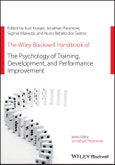"This Handbook is sure to become a key resource for any researcher or professional looking for the latest and most innovative thinking from around the world on the full range of topics related to training, development, and performance management."
Bradford S. Bell, PhD, Cornell University, USA. Editor, Personnel Psychology
"I wish I could have accessed this book many years ago. Comprehensive and scholarly, the four sections training, e-learning, personal and professional development and performance management fit well together and address a gap in the literature that has been apparent for some time. The psychological perspective speaks to growing interest in the micro-foundations of strategic success, and the blending together of both formal and informal perspectives on learning in organizations ensures a holistic rather than piecemeal approach to the question of how to build individual knowledge, skills, and competences in organizations. I believe that this book will make a significant impact on its target audience in this critical area."
Helen Shipton, Professor of International Human Resource Management, Nottingham Trent University, UK
The Wiley Blackwell Handbook of the Psychology of Training, Development, and Performance Improvement provides up-to-date, contemporary information for researchers and professionals by reviewing the latest literature and research in the interconnected fields of training, development, and performance appraisal. It brings a psychological perspective to bear on a multidisciplinary field that links to management, human resources, and education. Unique to reference works in this area, it maintains a truly global focus on the field with top international contributors looking at research and practice from around the world, including South America, Europe, Canada, and Australia, as well as the United States and the United Kingdom. The chapters cover a diverse range of important contemporary topics, such as needs analysis, job design, active learning, self-regulation, simulation approaches, 360-degree feedback, and virtual learning environments. Together, they offer researchers and professionals essential information for building a talented organization, a critical and challenging task for organizational success in the twenty-first century.
Table of Contents
About the Editors vii
About the Contributors ix
Foreword xiv
Series Preface xv
Railway Children xvii
1 The Psychology of Training, Development, and Performance Improvement 1
Kurt Kraiger, Jonathan Passmore, Sigmar Malvezzi & Nuno Rebelo dos Santos
Section I Training 11
2 The History of Training 13
Sigmar Malvezzi
3 Training Needs Analysis at Work 32
Rodrigo R. Ferreira, Gardênia da Silva Abbad, and Luciana Mourão
4 Training and Workplace Learning 50
Karen Evans and Natasha Kersh
5 Transfer of Socialization 68
Alan M. Saks
6 Encouraging Active Learning 92
Nina Keith and Christian Wolff
7 The Competencies of Effective Trainers and Teachers 117
Darryl Gauld
8 Training Evaluation 136
Jonathan Passmore and Maria Joao Velez
9 Knowledge Transfer and Organizational Learning 154
Linda Argote
Section II E-Learning 171
10 Facilitation in E-Learning 173
Annette Towler and Tyree Mitchell
11 Effective Virtual Learning Environments 188
Jean-Luc Gurtner
12 Game- and Simulation-Based Approaches to Training 205
Rebecca Grossman, Kyle Heyne, and Eduardo Salas
Section III Personal and Professional Development in Organizations 225
13 Training and Personal Development 227
Kurt Kraiger and Thomas M. Cavanagh
14 The Contribution of Talent Management to Organization Success 247
David G. Collings
15 Action Learning: Approaches, Applications, and Outcomes 261
Lisa Anderson and Charlotte Coleman
16 Knowledge-Sharing, Cooperation, and Personal Development 278
Leonor Pais and Nuno Rebelo dos Santos
17 Using Competences in Employee Development 303
Robert A. Roe
18 Personal Development Plan, Career Development, and Training 336
Simon Beausaert, Mien Segers, and Therese Grohnert
19 Leadership Development and Organizational Success 354
Thomas Garavan, Fergal O’Brien, and Sandra Watson
20 Structured Actions of Intentional Development 398
Nuno Rebelo dos Santos and Leonor Pais
21 Informal Learning and Development 419
Valéria Vieira de Moraes and Jairo Eduardo Borges-Andrade
Section IV Performance Management 437
22 Performance Appraisal and Development 439
Jeffrey R. Spence and Patricia L. Baratta
23 Designing Feedback to Achieve Performance Improvement 462
Manuel London and Edward M. Mone
24 Using 360-Degree Feedback as a Development Tool 486
Clive Fletcher
25 Feedback, Development, and Social Networks 503
Piet Van den Bossche, Sara van Waes, and Janine van der Rijt
Index 521








